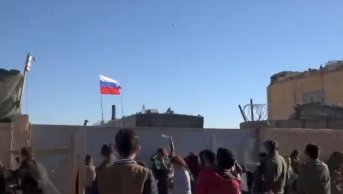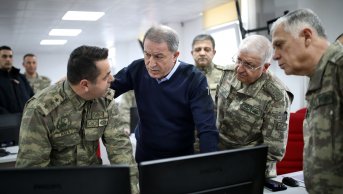Turkey's Position in Syrian Conflict with Radicals in Equation

The fact that the al-Qaeda-affiliated Islamic State of Iraq and al-Sham (ISIS) has grown stronger within the Syrian military opposition and expanded the area it has seized control of carries many risks for Turkey.
In world public opinion it is believed, rightly or wrongly, that al-Qaeda-linked groups are indirectly supported by Turkey as their actions against Syria are tolerated within the borders of the country. The strengthening of al-Qaeda in Syria and the understanding that Turkey is one of the powers behind it bring risks and disadvantages for Turkey's security and its Syria policy, which might be listed as follows:
- The al-Qaeda-linked groups are most effective across the border in close proximity to Turkey and in northern Syria. Due to the fact that radical Islamist groups, especially ISIS, have to a large extent seized control of the entire Al-Raqqah and the rural areas of Aleppo Province and established Islamic emirates, Turkey now has al-Qaeda in its southern border. Although there is no problem due to the common goal, which can be summarized as fighting against the Bashar al-Assad regime, at this point, the aforesaid groups might turn against Turkey in the near future. Steps such as to limit their realms of activity; to prevent the border line being used by radical groups; to fight against border smuggling; to fight against the activities of those groups along the border; and to object to the use of Turkish territories because of the pressure from the West might lead the aforesaid organizations to choose Turkey as their next target.
On Oct. 15, the Turkish Armed Forces (TSK) announced that it retaliated to the firing of a mortar round from Syria's Azaz and hit positions in ISIS, which makes sense in this regard.
- The Kurdish militia force, the Popular Protection Units (YPG), is the group that ISIS fights most in northern Syria. In addition to the armed struggle with the YPG, ISIS recently carried out attacks on Kurdish civilians. As a result, more than 200,000 Syrian Kurds had to migrate to northern Iraq and almost as many as them migrated to Turkey. The conflicts across Syria spread to Kurdish regions, and especially residential areas in rural areas were evacuated. Kurds blame al-Qaeda-affiliated ISIS for this situation. The most significant result of this development for Syrian Kurds is the fact that the YPG, which is the military wing of the Kurdistan Workers' Party's (PKK) Syrian political branch, the Democratic Union Party (PYD), comes to the fore as the only group with the potential to protect Syrian Kurds and which is strengthening its position among Syrian Kurds.
It has been understood that political parties other than the PYD are not capable of protecting Syrian Kurds against external threats. Also, the YPG has come to the forefront in its efforts to assume the role of protecting and representing Syrian Kurds. Hence, efforts to balance the PYD through Syrian Kurdish groups close to the president of the country's Kurdistan region, Massoud Barzani, with the indirect support of Turkey, have failed at this stage.
In addition to this, ISIS attacks on Syrian Kurds have weakened the link between Turkey and Syrian Kurds. Many Syrian Kurds believe that these attacks are carried out with the support of Turkey. Allegations that ISIS fighters benefit from the health services by crossing the border to Turkey and that they enter northern Syria through Turkish territories are effective in creating this belief. The PYD's resorting to such arguments reinforces the Syrian Kurds' negative opinion towards Turkey. Therefore, the strengthening of ISIS in northern Syria leads to a negative opinion among the people who live in along Turkey's border. This situation puts the “peace process,” which Turkey has been trying to maintain, into jeopardy. Because the PKK reads the ISIS attacks on the YPG as “Turkey's indirect attack” on itself.
- ISIS growing stronger in northern Syria has further triggered the mass migration. The target countries of the migration from northern Syria are Turkey and Iraq. While Syrians fleeing Idlib, Aleppo, Latakia and Al-Raqqah provinces for security reasons prefer Turkey, Syrians who flee northeastern regions and who are predominantly of Kurdish origin move to the territories of Iraq's Kurdistan Regional Government (KRG). The mass migration into Turkey increases as security weakens, and this situation means for Turkey that the existing problems regarding society, economy and security are increasing.
- Also, the fact that ISIS is getting stronger creates tension in Turkey's relations with the West and limits the opportunity to cooperate on Syria. Western countries, the US in particular, justify their insufficient aid to the Syrian opposition with the argument that “the aid is seized by radicals.” The decision by the US to “stop aid to the opposition until a clear split between moderate groups and radicals in Syria” is the latest example of this situation.
- The fact that the radicals are getting stronger creates an area of common interest and thus an opportunity to cooperate among countries that have different points of view in terms of the future of the regime in Syria. The conciliation between Russia and the US for “political settlement in Syria” and the diplomatic process that was launched on the destruction of chemical weapons can be given as an example. This situation damages Turkey's policy on the necessity for a regime change in Syria as soon as possible.
- The US's military operation came to the forefront following the Assad regime's resorting to chemical weapons on a Damascus suburb. The US announced that the military operation would be fleeting and would not aim at changing the regime. Turkey, on the other hand, stated that the scope of this operation is not sufficient and that the military operation should continue until the collapse of the regime as in Kosovo. All parties agree that the only way to change the regime in Syria in the short term is a military intervention led by the US. As understood from official statements, Turkey expects this.
However, with ISIS growing stronger, it almost cancels out the possibility of a military operation led by the US. US Secretary of State John Kerry put forward the US approach by stating that “there is no military solution to Syrian crisis, there is only a political solution.” Another reason for this approach is the assessment that an alternative regime could be worse in the case of the collapse of the current regime, and the radical Islamists could take over control of Syria.
- The image of Turkey in world public opinion is negatively affected due to the support given to radical elements in Syria. The statements of President Abdullah Gül following his weeklong visit to the US on the occasion of the United Nations General Assembly reflect the situation best. President Gül expressed Turkey's disappointment, saying, "While Turkey's hosting hundreds of thousands of people should have been emphasized and thus it should have been thanked," he felt disappointment in reminding that Turkey provided aid to radical elements in Syria.
Turkey gives support to all the opposition elements fighting against the regime within the framework of efforts to force the Assad regime to leave power. The strongest, most trained, convincing and organized groups among the opposition are radical Islamists.
While the radical Islamists' growing stronger weakens Turkey's efforts to mobilize the international community for a regime change, Turkey excluding these groups comes to mean that the struggle with the Assad regime would be damaged to a large extent. Besides, any effort to this end could lead the aforesaid groups to set Turkey as their target. Hence, the fact the radicals are getting stronger in Syria has entirely become a dilemma for Turkey.










